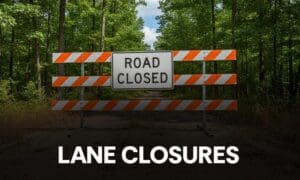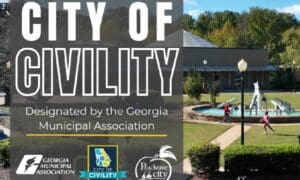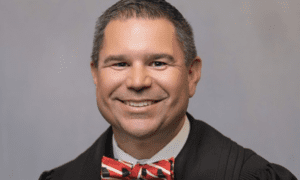Fayette County government officials are examining several different ways to fund the replacement of deteriorating stormwater pipes underneath county roads, along with other stormwater improvements.
At the second of three town hall meetings on the issue Monday night, residents continued to voice their opposition to bills for a stormwater utility designed to fund $15 million in future stormwater projects. The bills are calculated based on the amount of impervious surface on a lot, but one of the big beefs is that the fee doesn’t take into account the presence of ponds on each lot that actually improve the handling of stormwater.
County Manager Steve Rapson told the crowd that other funding options being looked at include the use of remaining proceeds from the 2003 countywide transportation sales tax, a concept that is being examined by the county attorney, or perhaps seeking voter approval for a new sales tax dedicated to stormwater repairs.
Another option is the creation of a special tax district that would allow for property tax increases to cover the expenses. Several residents have suggested such a proposal would at least allow them to write off the tax increase on their state and federal taxes.
One option not on the table which has drawn the ire of some residents is the possibility of charging the stormwater fees to residents in Peachtree City and Fayetteville. Commission Chairman Steve Brown explained that both municipalities already have their own stormwater program, and the county’s plans for unincorporated areas would not address stormwater issues in the cities. Charging the city residents as well would also be tantamount to a double tax situation, Brown has also said.
Another possibility off the table is the use of stimulus funding from the federal government, as no such funds are available, Rapson told the crowd Monday night. But there is the possibility of moving the stormwater employees back into the county’s general fund budget which creates the potential for reduced stormwater utility bills for residents in the unincorporated county.
The utility was created last September on a 3-2 vote by the county commission as a way to make sure there were enough funds on hand to prevent roads from being washed out by failing pipes, along with a need to prevent flooding damage to residents’ property.
Brown, who joined fellow holdover Commissioner Allen McCarty in voting against the stormwater utility, said the county failed to appropriately communicate the matter with its residents, but has noted that is changing with the three scheduled town hall meetings.
The average stormwater bill for a county resident is about $25, but the bills are based on a charge of 35 cents for every 1,000 square feet of impervious surface on a given lot, such as a house and paved driveway.
The fee is expected to garner about $667,000 for the county’s stormwater program this year. The fee is assessed on all parcels, including businesses and two entities that are typically excluded from property taxes: churches and schools.
A business with about 25,000 sq. ft. of impervious surface will pay about $123 a year in stormwater utility fees, county officials have said previously.
Residents shared their two cents’ worth Monday night for well over two hours, as the meeting lasted until there were no further comments or questions from the public.
Prior to the various public comments was a presentation by Brown and Rapson on the necessity for funding stormwater improvements. Brown noted that stormwater pipes underneath Flat Creek Trail needed to be replaced because they had rusted on the bottom and were going to fail.
Because a county fire station is located on Flat Creek Trail, a potential road failure would lead to extended response times to some residents, Brown said.
“We’ve got Flat Creek Trails all over the place, where pipes are separating and the bottoms are rusted out,” Brown said. “And we’re going to lose some more roads if we don’t do it. The problem is we don’t have the financial capacity to do that at this time.”
Brown noted that when the county replaces the rusted out metal corrugated pipes, it does so with concrete cast pipe, or in some cases a special concrete pipe lining that is being tested for longevity because it is far cheaper than installing new pipe.
One audience member asked if the stormwater utility funds could be spent on other projects. Rapson replied that they could not because they were collected for a special use.
Which prompted one audience member to loudly pipe up: “Wasn’t Social Security like this?”
Just like the first stormwater meeting, Brown pledged to meet with citizens who had stormwater problems at their home to see if they can be taken care of by the county. The county typically deals with stormwater problems caused along county rights of way, but is unable to help residents with other issues elsewhere on their property, Brown explained.
Some of the citizens’ concern Monday night was over why the county didn’t appropriately fund stormwater repairs in the past. Brown said he agreed that was an issue, but he pledged that the new commission will be dealing with the matter this year.
“You admitted that the county spent money on other things, but that’s not my fault,” one woman told Brown. “Why ask for a SPLOST, why ask to add to our county taxes, why? We already paid them! So figure out how to do it without digging into our pockets.”
Another speaker noted the vast majority of gray-haired residents in the room to point out how many people in attendance were living on fixed incomes and thus find it hard to pay a brand-new bill.











Leave a Comment
You must be logged in to post a comment.